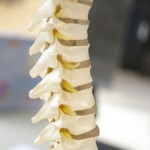Why you should include your spine in health checks and screenings
 We all reach that certain age when health professionals advise us to get screened for this, that, or the other thing. But what about your spinal health?
We all reach that certain age when health professionals advise us to get screened for this, that, or the other thing. But what about your spinal health?
A patient of ours recently decided it was time for colon cancer check. Cancer Care Ontario advises people on when they should get screened for various cancers with its Screen for Life program.
Women who are at high risk of breast cancer due to family history, or 50 years old, are advised to get screened. For cervical cancer, the starting age is 21 (if sexually active). Men have their own cross to bear with prostate cancer. And everyone is advised to screen for colon cancer starting by age 50, or sooner, if there is a family history of the disease.
And then there are things like high blood pressure risk due to your weight, diet, and activity level (or lack thereof) – the so-called “silent killer” because you can have elevated blood pressure that is doing harm to your body for years without any obvious symptoms.
These are all valid health concerns that warrant your attention. But what about your spinal health?
We see the evidence every day in our office
Problems with the spine that lead to chronic pain, loss of mobility, and irreversible arthritic degeneration of the vertebrae and the discs meant to cushion them.
Age is often less of a factor than lifestyle. We see kids 10 or 12 years old with neck problems comparable to that of their parents – hours a day hunched over a mobile device is causing the same damage as a work day hunched over a keyboard. Both have lost the natural curve of their neck – their vertebrae have shifted out of their proper alignment. It doesn’t happen overnight – it takes months or years of the same repetitive activity or posture.
The result is the misalignment creates tension in the spinal cord.
But the spinal cord is the information superhighway of your entire central nervous system; it controls and regulates every part of your body. That includes things you don’t voluntarily control, like heart, liver, and bowel function, as well as things you do, like mustering your muscles to shovel snow, or zoom in for a shot on goal.
Which means your overall health can suffer in various subtle ways if your spinal cord is in this kind of distress. Back or neck pain is just the most obvious symptom.
Doesn’t it just make sense to get screened?
I know, many people are reluctant to do so. They have a suspicion that we are always going to find something that needs to be fixed.
But here’s the simple truth – if you spend hours each day doing something that is obviously not good for the long-term health of your spine, it only goes to reason that you are suffering a growing issue as a result.
Just because you ignore a risk factor doesn’t mean it goes away. Avoiding the dentist doesn’t prevent you from getting a cavity, in fact, it’s likely to cause you more pain, both in your mouth and in your wallet, down the road. You know this is true – that’s why you get regular dental check-ups.
Same goes for your risk of high-blood pressure, or colorectal cancer, or breast cancer. We don’t like bad news, but the rationale for spinal screening is no different than it is for all those other illnesses – early detection and treatment decreases your risk of more severe consequences down the road.
Signs you should get your spine checked
So, don’t wait, come and get screened for your spinal health. Here is a checklist of things to watch for that warrant a visit to our office:
- First, understand that a problem with your spine’s alignment, what we call a subluxation, is very much like a dental cavity – you often don’t even know you have one.
- Look at your leisure activities: Do you play impact sports or undertake activities where you regularly take a rag-doll tumble – anything from full-contact ice hockey and football, to water-skiing.
- Look at your device use: From long work days at a desk, or hours with a smartphone, tablet or game controller, parents and kids alike have the same resulting risk factors.
- Have you been in a car accident that resulted in any kind of back injury or whiplash?
- Do you regularly lug around a heavy pack or bag that leaves your shoulders feeling stiff or off-balance?
- Have you suffered any other accident, fall, or head bump that resulted in pain and inflammation lasting more than a couple of days?
- Do you suffer any recurring or chronic pain in your neck/spine? It is not normal to rely on a regular diet of painkillers.
- By the same token, do you have stiffness in the neck with tingling or numbness in the extremities?
If you answered yes to any of these questions, odds are your spine is at risk. Come see us for a look.
